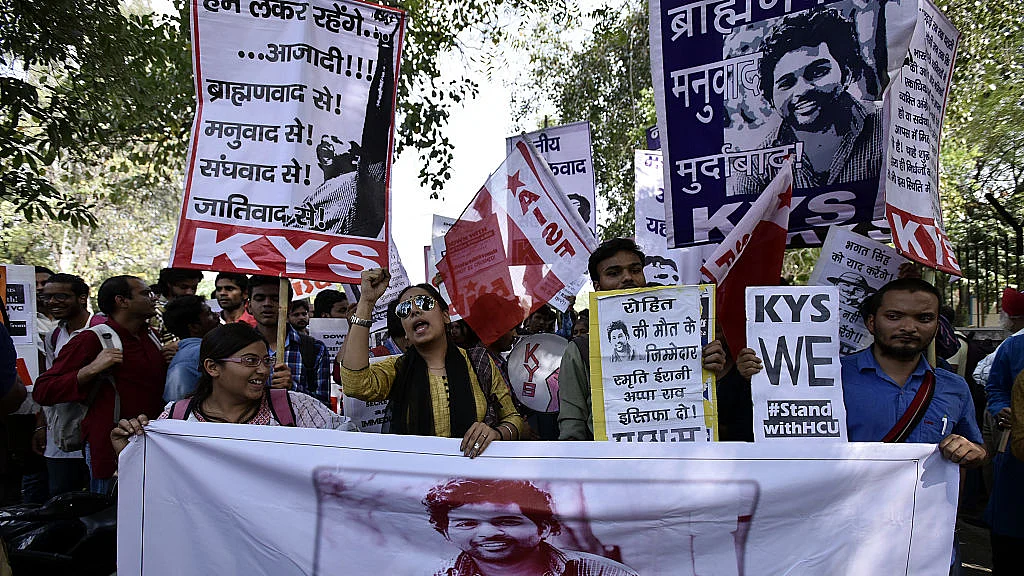Civil society wants law against torture, protection of activists
Endorsing the citizens’ right to criticise the Government, a report sent to the United Nations demands laws against torture and for protection of RTI activists in India

Members of Indian civil society from diverse sectors, have come together to severely criticise India's increasingly deteriorating human rights situation, the shrinking democratic spaces, the current government's persecution of NGOs and harassment of minorities and demanded a national law for the protection of RTI, human rights activists, and journalists in India.
These issues and more were detailed in the Joint Stakeholders’ Report on India’s overall human rights situation released by the Working Group on Human Rights in India and United Nations (WGHR) in New Delhi. The report was submitted to the UN Human Rights Council for the upcoming third Universal Periodic Review (UPR) of India due to take place at Geneva in May 2017, under which India’s human rights record between 2012-2017, obligations and commitments will be evaluated by 193 member states of the UN at the UNHRC.
“The climate of fear and hate being systematically promoted through vigilante mobs on the streets and online trolls against dissent, difference and diversity poses a grave threat to democracy.”Working Group on Human Rights in India
Milan Kothari, the former special rapporteur of the UN called the report “the biggest expose of human rights issues in India and there is nothing that the Indian government can do about it.”
The report which has been endorsed by more than a thousand NGOs, lawyers and activists from all over India, will be used as one of the resources by member countries of Human Rights Council to question the Indian government.
The report is “the biggest expose of human rights issues in India and there is nothing that the Indian government can do about it.”Milan Kothari
Henri Tiphagne, convenor of WGHR, said various UN bodies and several governments have expressed their concern on severe restrictions and actions by the Indian Government. He said, “As India claims to move ahead with developmental agenda, no development can be at the cost of crushing of fundamental rights of dissent and protest which are the basic elements of our democracy.”
Enakshi Ganguly, Co-director of HAQ: Centre for Child Rights, slammed the autonomy of national human rights institutions, saying that “the Child Rights Commission and the National Human Rights Commission have become like arms of the government”. She said that it is sad that in a country that claims to have become a global leader in the last three years, the status and condition of children have not seen any meaningful improvement since UPR 2.
She strongly criticised the new Juvenile Justice Act of 2015 which includes a regressive provision of waiver of 16-18 year olds into the adult criminal justice system, and has been created to treat children in conflict with the law like adults.
“As India claims to move ahead with developmental agenda, no development can be at the cost of crushing of fundamental rights of dissent and protest which are the basic elements of our democracy.”Henri Tiphagne
Senior human rights lawyer Vrinda Grover said that “It’s my right as a citizen to criticise the government”. She expressed concern over the failure of the Indian state to honour its pledges at the earlier UPRs and highlighted that despite assurances to the Human Rights Council, India had still not ratified the Convention Against Torture, and no law against torture has been passed by the Indian Parliament to date.
She said that situation reports from Chhattisgarh are very disturbing where Adivasi women were being sexually assaulted and men killed in extra judicial killings by police and security forces; and lawyers, journalists, activists and academics highlighting these egregious violations are being targeted by the police and administration.
“We are called anti-nationals because we are trying to strengthen the Indian society and the rights of SC and ST.”Paul Divakar
Paul Divakar, Dalit activist and the General Secretary of National Campaign for Dalit Human Rights, also came down heavily on the current regime's attitude towards Dalits, saying, "In 2014, 46,000 cases were registered against Dalits, but only 10% have come to trial.” He said, "We are called anti-nationals because we are trying to strengthen the Indian society and the rights of SC and ST." He called the increasing lack of space for civil society a "downright condemnation of human rights" and not an internal matter of India.
“The climate of fear and hate being systematically promoted through vigilante mobs on the streets and online trolls against dissent, difference and diversity poses a grave threat to democracy,” says the report.
Vrinda Grover added, “Denial is the habit of the Indian state. But the worse thing is that it does not listen to even recommendations proposed.”
Follow us on: Facebook, Twitter, Google News, Instagram
Join our official telegram channel (@nationalherald) and stay updated with the latest headlines
- Chhattisgarh
- NGOs
- United Nations
- Dalits
- journalists
- Adivasi
- civil society
- torture
- RTI activists
- human rights
- minorities
- Joint Stakeholders’ Report
- Working Group on Human Rights in India
- WGHR
- UN
- Human Rights Council
- Geneva
- UNHRC
- Milan Kothari
- Henri Tiphagne
- Enakshi Ganguly
- HAQ: Centre for Child Rights
- Child Rights Commission
- Juvenile Justice Act
- Vrinda Grover
- Convention Against Torture
- sexual assault
- extra judicial killings
- Paul Divakar
- Dalit activist
- National Campaign for Dalit Human Rights